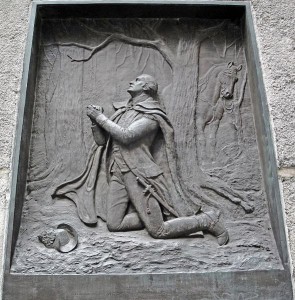 CINCINNATI – The Sixth Circuit Court of Appeals affirmed this week that prayers given before legislative bodies are constitutional, despite atheist assertions that such practices cannot withstand legal scrutiny.
CINCINNATI – The Sixth Circuit Court of Appeals affirmed this week that prayers given before legislative bodies are constitutional, despite atheist assertions that such practices cannot withstand legal scrutiny.
Last summer, the Freedom from Religion Foundation (FFRF) mailed a letter to officials in Hamilton County, Tennessee to complain about citizen-led prayers that are regularly given before county commission meetings. Although county commissioners invite individuals from all different faiths to lead the prayers, FFRF argued that the practice was unconstitutional, since a majority of the invocations are given in “Jesus’ name.”
“First and foremost,” FFRF’s letter stated, “prayer at government meetings is unnecessary, inappropriate, and divisive. Commission members are free to pray privately or to worship on their own time in their own way. They do not need to worship on taxpayers’ time. The Commission ought not to lend its power and prestige to religion, amounting to a governmental endorsement that excludes the 15% of the American population that is nonreligious.”
Soon after FFRF’s letter was sent, Brandon Jones and Thomas Coleman—both members of the local Chattanooga Freethought Association—filed a lawsuit against the county, demanding that it immediately suspend their prayer routines.
Following the lawsuit from Jones and Coleman, members of the Hamilton County Commission adopted an official prayer policy, called “Resolution 712-13.” Though their practice of facilitating prayers before meetings was not new, the commissioners passed the resolution to clearly lay out and define their prayer policies.
“Any invocation that may be offered before the official start of the Commission meeting shall be the voluntary offering of a private citizen, to and for the benefit of the Commission,” the prayer policy read. “The views or beliefs expressed by the invocation speaker have not been previously reviewed or approved by the Commission and do not necessarily represent the religious beliefs or views of the Commission in part or as a whole. No member of the community is required to attend or participate in the invocation and such decision will have no impact on their right to actively participate in the business of the Commission.”
In late August of last year, Judge Harry Mattice of Chattanooga’s U.S. District Court heard arguments from both sides of the issue, and eventually declared the county’s prayer policies acceptable in a 37-page ruling. Although Judge Mattice admitted that evaluating the constitutionality of legislative prayers was a “difficult task,” he concluded that “legislative prayer is, in general, permissible.”
“[T]he Establishment Clause is not offended if a legislature formally invokes divine blessings on its official business,” he further explained in the verdict. “Hamilton County’s prayer policy evinces no impermissible motive that may be fairly ascribed to the Commission. There is no evidence that the County seeks to use the prayer opportunity to advance one faith or disparage another. The policy’s overt goals are all-inclusive, contemplating invocations offered by citizens of various creeds.”
Soon after Judge Mattice handed down the decision in favor of the prayer policy, denying an injunction against the practice, Jones and Coleman filed a legal appeal to the ruling. Their appeal was heard this month by the Sixth Circuit Court of Appeals in Cincinnati, and attorney Robin Flores represented the two men, claiming the county’s prayer policy “turns a governmental function into a worship service.”
However, the Sixth Circuit Court of Appeals published an opinion on Friday, likewise refusing to grant an injunction. In the 21-page opinion, Judge Avern Cohn wrote that—unless new evidence shows otherwise—the commission’s prayer policy is “constitutional on its face.”
Additionally, by citing case law from the Supreme Court, the court reaffirmed the importance that legislative prayer has held throughout U.S. history.
“The Senate and House elected their first chaplains in 1789,” he wrote. “As the Supreme Court explained, ‘[i]t can hardly be thought that in the same week Members of the First Congress voted to appoint and to pay a Chaplain for each House and also voted to approve the draft of the First Amendment’ that ‘they intended the Establishment Clause of the Amendment to forbid what they had just declared acceptable.’ The Supreme Court concluded that, ‘[i]n light of the unambiguous and unbroken history of more than 200 years, there can be no doubt that the practice of opening legislative sessions with prayer has become part of the fabric of our society.’”
The case will now move forward for further legal review.
Become a Christian News Network Supporter...


